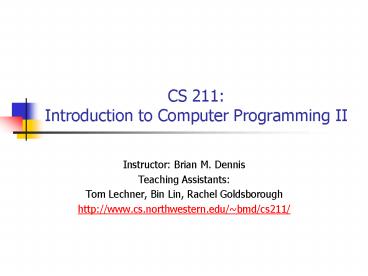CS 211: Introduction to Computer Programming II - PowerPoint PPT Presentation
1 / 16
Title:
CS 211: Introduction to Computer Programming II
Description:
CS 211: Introduction to Computer Programming II. Instructor: ... { MLBPlayer sammy_sosa('Sammy Sosa', 'Chicago Cubs'); MLBPlayer* bmd_wishes = &sammy_sosa; ... – PowerPoint PPT presentation
Number of Views:43
Avg rating:3.0/5.0
Title: CS 211: Introduction to Computer Programming II
1
CS 211Introduction to Computer Programming II
- Instructor Brian M. Dennis
- Teaching Assistants
- Tom Lechner, Bin Lin, Rachel Goldsborough
- http//www.cs.northwestern.edu/bmd/cs211/
2
Todays Topics
- Introduction to classes
- Class declaration
- Instance creation
- Members
- Constructors
- Some mopup
- Dynamic allocation
- Binary numbers
- Next week's schedule
- Lecture
- Monday Tuesday
- Wednesday
- Quiz 1
- Friday
- Quiz 1 back hopefully
- Reading
- 6.5 6.10
3
Issues with structs
- Initialization
- Not guaranteed
- Done by hand
- Packaging datatypes behavior
- Connecting
- Reuse / extension
- Salaried players
4
Basics of classes
- // An example of declaring
- // a new user defined type, using the class mech
- class MLBPlayer
- public
- MLBPlayer(char name, char team)
- private
- enum Hit SINGLE 0, DOUBLE, TRIPLE, HOMER
- char name
- char team
- int at_bats
- int walks
- int hits4
- float batting_average
- bool bats_lefty
5
Basics of classes
- include "MLBPlayer.h"
- include ltcstringgt
- MLBPlayerMLBPlayer(char n, char t)
- int cnt strlen(n) 1
- name new charcnt
- strcpy(name, n)
- cnt strlen(t) 1
- strcpy(team, t)
- at_bats walks 0
- bats_lefty false
- batting_average 0.0
- for (int i 0 I lt 4 i) hitsi 0
6
Basics of classes
- // Moving some private fields to public for
convenience - class MLBPlayer
- public
- MLBPlayer(char name, char team)
- int at_bats
- int walks
- float batting_average
- private
- enum Hit SINGLE 0, DOUBLE, TRIPLE, HOMER
- char name
- char team
- int hits4
- bool bats_lefty
7
Basics of classes
- include ltiostreamgt
- using namespace std
- include "MLBPlayer.h"
- // Accessing public member variables
- int main(int argc, char argv)
- MLBPlayer sammy_sosa("Sammy Sosa", "Chicago
Cubs") - MLBPlayer bmd_wishes sammy_sosa
- sammy_sosa.at_bats 1
- int total_hits 0
- for (int i 0 i lt 4 i)
- total_hits sammy_sosa.hitsi
- bmd_wishes-gtbatting_average
- total_hits / bmd_wishes-gtat_bats
- return 0
8
Basics of classes
- // Instead of public fields, let's write public
accessor funcs - class MLBPlayer
- public
- MLBPlayer(char name, char team)
- enum Hit SINGLE 0, DOUBLE, TRIPLE, HOMER
- int totalHits()
- float battingAverage()
- void addHit(int hit)
- void strikeout()
- private
- char name char team
- int at_bats int walks
- int hits4
- float batting_average
- bool bats_lefty
9
Basics of classes
- int MLBPlayertotalHits()
- int hits_count 0
- for (int i 0 i lt 4 i)
- hits_count hitsi
- return hits_count
- void MLBPlayeraddHit(int hit)
- at_bats
- if ((SINGLE lt hit) (hit lt HOMER))
- hitshit 1
10
Basics of classes
- float MLBPlayerbattingAverage()
- return totalHits() / (at_bats 1.0f)
- void MLBPlayerstrikeout()
- at_bats
11
Basics of classes
- include ltiostreamgt
- using namespace std
- include "MLBPlayer.h"
- // Now using public accessor functions
- int main(int argc, char argv)
- MLBPlayer sammy_sosa("Sammy Sosa", "Chicago
Cubs") - MLBPlayer bmd_wishes sammy_sosa
- sammy_sosa.addHit(MLBPlayerSINGLE)
- sammy_sosa.strikeout()
- sammy_sosa.strikeout()
- float ba sammy_sosa.battingAverage()
- return 0
12
Basics of classes
- include ltiostreamgt
- using namespace std
- include "MLBPlayer.h"
- // Now using public accessor functions
- int main(int argc, char argv)
- MLBPlayer sammy_sosa("Sammy Sosa", "Chicago
Cubs") - MLBPlayer bmd_wishes sammy_sosa
- bmd_wishes-gtaddHit(MLBPlayerSINGLE)
- bmd_wishes-gtstrikeout()
- bmd_wishes-gtstrikeout()
- float ba bmd_wishes-gtbattingAverage()
- return 0
13
Basics of classes
- // Use overloading to define default constructor
- class MLBPlayer
- public
- MLBPlayer(char name, char team)
- MLBPlayer()
- enum Hit SINGLE 0, DOUBLE, TRIPLE, HOMER
int totalHits() - float battingAverage()
- void addHit(int hit)
- void strikeout()
- private
- char name char team
- int at_bats int walks
- int hits4
- float batting_average
- bool bats_lefty
14
Basics of classes
- include "MLBPlayer.h"
- // Stuff elided
- MLBPlayerMLBPlayer()
- char n "Joe Schlabotnik"
- char t "Waffletown Syrups"
- int cnt strlen(n) 1
- name new charcnt
- strcpy(name, n)
- cnt strlen(t) 1
- strcpy(team, t)
- at_bats walks 0
- bats_lefty false
- batting_average 0.0
- for (int i 0 i lt 4 i) hitsi 0
15
Basics of classes
- include ltiostreamgt
- using namespace std
- include "MLBPlayer.h"
- int main(int argc, char argv)
- // Imagine all our old stuff here.
- MLBPlayer black_sox9
- MLBPlayer joe_s new MLBPlayer
- joe_s new MLBPlayer()
- joe_s new MLBPlayer("Joe Schlabotnik",
"Waffletown Syrups") - return 0
16
Dynamic allocation
- include ltcstringgt
- // Leaves us with a dangling pointer, also wastes
space - char dup_string(char s)
- const int max_buf 1024
- char bufmax_buf
- strcpy(buf, s)
- return buf
- // Using dynamic allocation we're okay
- char dup_string(char s)
- int cnt strlen(s) 1
- char new_string new charcnt
- return new_string
17
Thats a Wrap
- Take away
- Classes are an improved form of structs
- Know how to declare classes, define member
functions - Dynamic allocation
- Space managed by program at run time
- Binary representations

